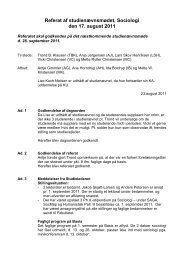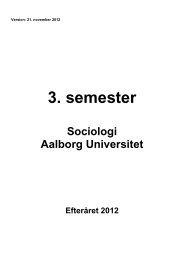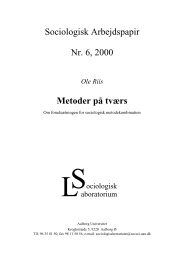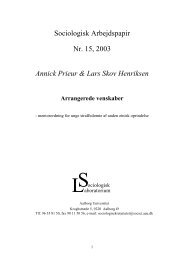Utopianism in the Work of Zygmunt Bauman - Sociologi - Aalborg ...
Utopianism in the Work of Zygmunt Bauman - Sociologi - Aalborg ...
Utopianism in the Work of Zygmunt Bauman - Sociologi - Aalborg ...
You also want an ePaper? Increase the reach of your titles
YUMPU automatically turns print PDFs into web optimized ePapers that Google loves.
ally ceas<strong>in</strong>g to be a utopia” (Kolakowski 1969:92). Only by be<strong>in</strong>g presented by proponents<br />
and protagonists as utopia, as someth<strong>in</strong>g ultimately to be realised at a later stage <strong>of</strong> human<br />
development, will utopias cease to be utopian.<br />
5 This does far from mean that <strong>Bauman</strong> has shed himself <strong>of</strong> his socialist sympathies. In a recently<br />
conducted <strong>in</strong>terview he <strong>in</strong> eloquent fashion presents <strong>the</strong> follow<strong>in</strong>g diagnosis <strong>of</strong> socialism:<br />
“Like <strong>the</strong> phoenix, socialism is reborn from every pile <strong>of</strong> ashes left day <strong>in</strong>, day out, by<br />
burned-out human dreams and charred hopes. It will keep on be<strong>in</strong>g resurrected as long as<br />
<strong>the</strong> dreams are burnt and <strong>the</strong> hopes are charred, as long as human life rema<strong>in</strong>s short <strong>of</strong> <strong>the</strong><br />
dignity it deserves and <strong>the</strong> nobility it would be able, given a chance, to muster. And if it were<br />
<strong>the</strong> case, I hope I’d die a socialist” (<strong>Bauman</strong> & Tester 2001:155).<br />
6 In his first book published <strong>in</strong> English, Between Class and Elite, <strong>Bauman</strong> ends on a contemplative<br />
note when remark<strong>in</strong>g that “human history is notorious for its <strong>in</strong>sidious defiance <strong>of</strong><br />
probabilities” (<strong>Bauman</strong> 1972:322). History and its future developments cannot be calculated<br />
<strong>in</strong> advance.<br />
7 Despite his relentless critique <strong>of</strong> realism, <strong>Bauman</strong> does not want his utopianism merely to be<br />
dream<strong>in</strong>g. In this he could be associated with <strong>the</strong> so-called ‘Real Utopias Project’ <strong>in</strong>itiated by<br />
Erik Ol<strong>in</strong> Wright <strong>in</strong> which <strong>the</strong> desire accord<strong>in</strong>g to its programmatical statement is to propose<br />
“utopian ideals that are grounded <strong>in</strong> <strong>the</strong> real potentials <strong>of</strong> humanity, utopian dest<strong>in</strong>ations<br />
that have pragmatically accessible waystations, utopian designs <strong>of</strong> <strong>in</strong>stitutions that can <strong>in</strong>form<br />
our practical tasks <strong>of</strong> muddl<strong>in</strong>g through <strong>in</strong> a world <strong>of</strong> imperfect conditions for social<br />
change” (Wright 2003:viii). So far <strong>the</strong> ‘project’ have resulted <strong>in</strong> four volumes deal<strong>in</strong>g with<br />
<strong>in</strong>stitutional democracy, voluntary associations, market socialism and egalitarianism between<br />
state, market and community.<br />
8 <strong>Bauman</strong> captures especially <strong>the</strong> core concern <strong>of</strong> modern utopias when he states that <strong>the</strong>y<br />
“were anyth<strong>in</strong>g but flights <strong>of</strong> fancy or <strong>the</strong> waste products <strong>of</strong> <strong>the</strong> imag<strong>in</strong>ation. They were bluepr<strong>in</strong>ts<br />
for <strong>the</strong> human-controlled world to come, a declaration <strong>of</strong> <strong>the</strong> <strong>in</strong>tent to force that world<br />
to come, and <strong>the</strong> serious calculation <strong>of</strong> <strong>the</strong> means necessary to do it […] A remarkable feature<br />
<strong>of</strong> modern utopias was <strong>the</strong> attention devoted to <strong>the</strong> meticulous plann<strong>in</strong>g <strong>of</strong> <strong>the</strong> environment<br />
<strong>of</strong> daily life […] Utopian <strong>in</strong>ventions were strik<strong>in</strong>gly similar to each o<strong>the</strong>r bear<strong>in</strong>g vivid<br />
testimony to <strong>the</strong> shared obsession that gave birth to all <strong>of</strong> <strong>the</strong>m: that <strong>of</strong> transparency and unequivocality<br />
<strong>of</strong> sett<strong>in</strong>g, capable <strong>of</strong> heal<strong>in</strong>g or ward<strong>in</strong>g <strong>of</strong>f <strong>the</strong> agony <strong>of</strong> risky choice” (<strong>Bauman</strong><br />
2001b:64).<br />
9 The modernist utopias were erected and drafted at a time when <strong>the</strong> world desperately craved<br />
and demanded order. Thus, “utopia was to be <strong>the</strong> fortress <strong>of</strong> certa<strong>in</strong>ty and stability; a k<strong>in</strong>gdom<br />
<strong>of</strong> tranquillity. Instead <strong>of</strong> confusion – clarity and self-assurance. Instead <strong>of</strong> <strong>the</strong> caprices<br />
<strong>of</strong> fate – a steady and consistent, surprise-free sequence <strong>of</strong> causes and effects. Instead <strong>of</strong> <strong>the</strong><br />
labyr<strong>in</strong>th<strong>in</strong>e muddle <strong>of</strong> twisted passages and sharp corners – straight, beaten and wellmarked<br />
tracks. Instead <strong>of</strong> opacity – transparency. Instead <strong>of</strong> randomness – a well-entrenched<br />
and utterly predictable rout<strong>in</strong>e […] Utopias were bluepr<strong>in</strong>ts for <strong>the</strong> rout<strong>in</strong>e hoped to be resurrected”<br />
(<strong>Bauman</strong> 2002a:229). In this fashion, modern utopias conta<strong>in</strong>ed a certa<strong>in</strong> core element<br />
<strong>of</strong> premodern rout<strong>in</strong>ised traditionalism, however this time spiced up with <strong>the</strong> ordermak<strong>in</strong>g<br />
obsession: “Utopia was a vision <strong>of</strong> a closely watched, monitored, adm<strong>in</strong>istered and<br />
daily managed world. Above all, it is a vision <strong>of</strong> a predesigned world, a world <strong>in</strong> which prediction<br />
and plann<strong>in</strong>g starve <strong>of</strong>f <strong>the</strong> play <strong>of</strong> chance” (<strong>Bauman</strong> 2002a:230). The play <strong>of</strong> chance<br />
and <strong>the</strong> presence <strong>of</strong> fate <strong>in</strong> premodernity have <strong>in</strong> <strong>the</strong> modern utopian order been annihilated.<br />
10 It is <strong>in</strong>terest<strong>in</strong>g to note that <strong>in</strong> recent years, travel agencies bear<strong>in</strong>g names such as Utopia<br />
Travels or Utopia Tours have seen <strong>the</strong> light <strong>of</strong> day. Whereas most o<strong>the</strong>r travel agencies <strong>in</strong><br />
boastful fashion would normally use slogans such as ‘We Will Take You Anywhere’, charac-<br />
46










